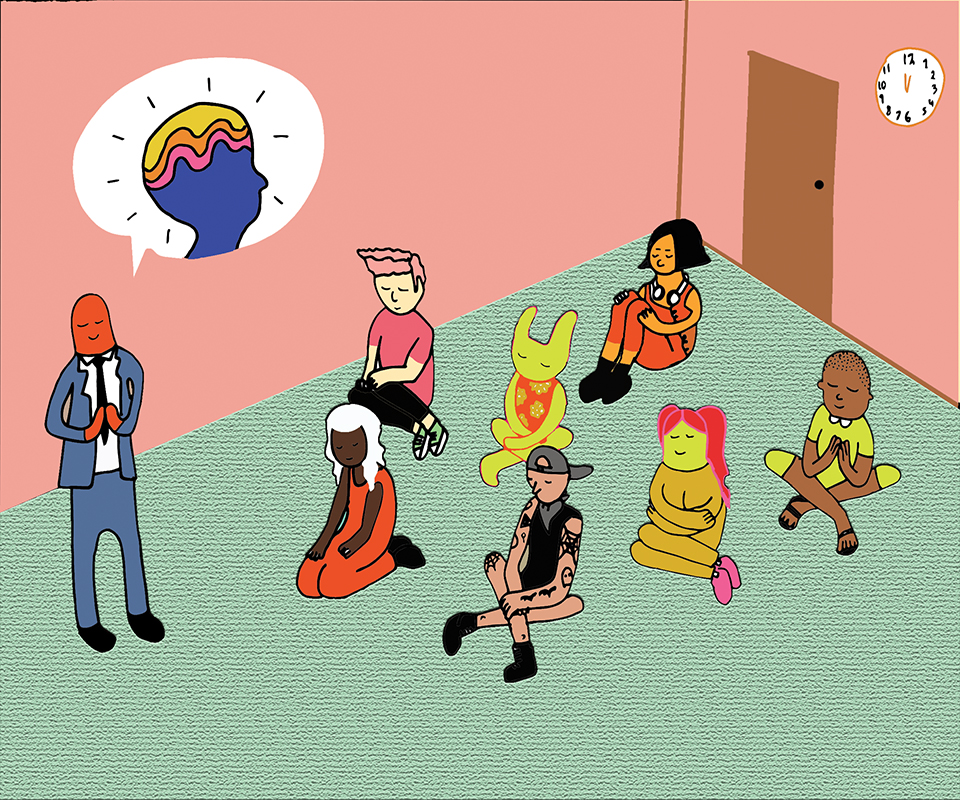CSU funds three four-week workshops to teach stress management.
The Concordia Student Union (CSU) has allocated $5,000 for three four-week mindfulness training programs given by The Mindful Project for the 2018-19 academic year.
The mindfulness program will run for four consecutive weeks between midterms and finals. The program will be held three times a year: once in the fall term on the Loyola campus, and once at each campus in the winter term.
Each session will last an hour and 45 minutes, which includes 30 minutes of theory and 45 minutes of practice. Each week will focus on one of five themes: mindfulness, stress, procrastination, empathy, and self-compassion.
Sophie Hough-Martin, General Coordinator of the CSU, said that this idea was first proposed by psychology student, Léa Homer, who presented data to prove that mindfulness training has a positive impact on students. This data was collected during the previous academic year, when the workshop was held at the Loyola chapel in the fall and winter terms, and funded by Concordia’s Undergraduate Psychology Association (CUPA).
Hough-Martin brought Homer’s idea to the council meeting on Aug. 22, and council voted to support the program for this academic year. This is the first year the CSU will fund the program. “We ran on a platform that centred on mental health, and this project directly relates to giving students an accessible, affordable method of receiving training in mindfulness and meditation that would otherwise be financially unviable for them,” Hough-Martin said.
Homer, now the coordinator of The Mindful Project, said the idea to create mindfulness training workshops for students came from being a psychology student and having the desire to help people. “I always knew I wanted to work in mindfulness related to psychology,” she said. “I saw that there wasn’t this program offered at Concordia and I really believed that I could put it together.”
Elvis Grahović, a lawyer, mindfulness coach and the instructor of The Mindful Project, said mindfulness is defined as paying attention to the present moment without being judgmental. “It is a state of mind that everybody can access,” he said. “It is being able to assess what is happening inside of you.”
Homer said mindfulness helps students face their daily struggles with curiosity, openness and kindness. “It teaches you to focus on the present moment with an open mind,” she said, adding that students are a vulnerable population and are prone to stress and anxiety. She also said mindfulness programs around the city can be expensive, so it was crucial for her to make the program affordable.
Grahović said the workshops aim to show students different meditation practices. He hopes students will obtain a sense of peace from the program. “My biggest wish is for students to really make the practice their own,” he said.
Hough-Martin will work with council to extend the program after this year if the workshops are beneficial for students. “Pending the success of this year’s Mindful Project, we will be re-assessing and asking council to set in place a long-term strategy for continual funding of The Mindful Project and other mental health and wellness initiatives like it on campus,” she said.
“If you believe and understand that your brain and your mind are the most important assets that you have, taking care of it makes sense,” Grahović said.
Graphic by @spooky_soda




